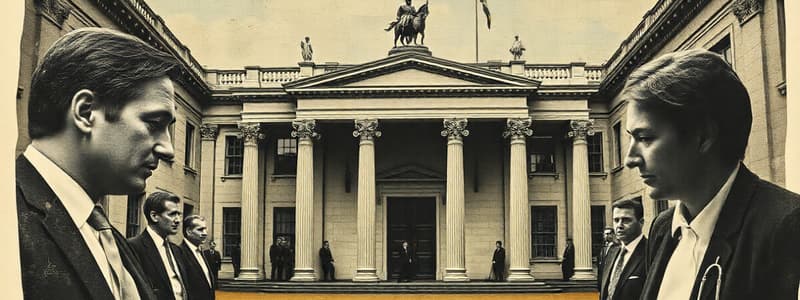Podcast
Questions and Answers
What is the primary function of the Judicial Appointments Advisory Board (JAAB)?
What is the primary function of the Judicial Appointments Advisory Board (JAAB)?
Which article of the Constitution explicitly emphasizes judicial independence?
Which article of the Constitution explicitly emphasizes judicial independence?
What significant legal principle is addressed by the impeachment process for judges?
What significant legal principle is addressed by the impeachment process for judges?
Which court handles small claims?
Which court handles small claims?
Signup and view all the answers
In which year was the Judicial Council Act enacted?
In which year was the Judicial Council Act enacted?
Signup and view all the answers
What case is associated with the impeachment motion calling for the resignation of a judge?
What case is associated with the impeachment motion calling for the resignation of a judge?
Signup and view all the answers
What was a key factor in the ‘Golfgate’ incident involving Justice Wolfe?
What was a key factor in the ‘Golfgate’ incident involving Justice Wolfe?
Signup and view all the answers
Which judicial body addresses issues related to judicial conduct in Ireland?
Which judicial body addresses issues related to judicial conduct in Ireland?
Signup and view all the answers
What document outlines the basic framework of the courts system in Ireland?
What document outlines the basic framework of the courts system in Ireland?
Signup and view all the answers
Which of the following courts is categorized as a Superior Court in Ireland?
Which of the following courts is categorized as a Superior Court in Ireland?
Signup and view all the answers
A major change to the Irish courts system requires what?
A major change to the Irish courts system requires what?
Signup and view all the answers
What is typically the nature of cases heard in public in the Irish legal system?
What is typically the nature of cases heard in public in the Irish legal system?
Signup and view all the answers
What is the term for court hearings that occur without the public present?
What is the term for court hearings that occur without the public present?
Signup and view all the answers
Which court acts as the Central Criminal Court in Ireland?
Which court acts as the Central Criminal Court in Ireland?
Signup and view all the answers
What is one of the main purposes of the Courts Service Act 1998?
What is one of the main purposes of the Courts Service Act 1998?
Signup and view all the answers
Which court requires a jury for criminal cases in the Irish legal system?
Which court requires a jury for criminal cases in the Irish legal system?
Signup and view all the answers
Study Notes
Irish Legal System - Courts and Legal Personnel
- The Irish legal system comprises courts and legal personnel, with specific functions and structures.
- Courts are governed by the Constitution (Articles 34-37) and further details in legislation, like the Courts (Establishment and Constitution) Act 1961 and the Courts and Court Officers Act 1995. Changes to the system, including modifications to courts, can be enacted through legislation. Significant alterations demand Constitutional amendment (e.g., the 33rd Amendment (2013) concerning new Court of Appeal).
- Cases are typically heard publicly ("open justice") though some proceedings ("in camera") can happen in private. Examples of private hearings include situations involving contempt of court that interferes with justice administration or cases with criminal ramifications. The Irish Times Ltd v Ireland (1998) case provides relevant context.
- The court system includes courts of first instance and courts of appeal. Superior courts encompass the High Court, Court of Appeal, and Supreme Court. Inferior courts, like the District Court and Circuit Court, settle cases based on limited jurisdictional constraints.
- The Supreme Court is the highest court of appeal with responsibility for final decisions in civil and criminal affairs. It can rule on legislation's constitutionality and the President’s permanent incapacity. The court is mostly staffed by three judges, though up to seven judges can participate in specific cases.
- The High Court is a court with original jurisdiction, determining matters of fact and law, as well as assessing legal rulings.
- Appeals from the High Court are settled by the Court of Appeal, while appeals from the Circuit Criminal Court, the Central Criminal Court, or the Special Criminal Court are also resolved through this same court.
- The Circuit Court manages cases of limited and regional jurisdiction involving civil cases with claims up to €75,000, family law (divorce, etc) and criminal offenses excluding those in the Central Criminal Court.
- The Special Criminal Court sits if ordinary courts prove unsuitable to ensure justice and public order.
- The District Court manages cases with claims up to €15,000, family cases (custody, maintenance, etc.) and criminal cases excluding cases handled by Central Criminal Court. This court utilizes the Small Claims Procedure.
Administration of the Courts
- The Courts Service Act 1998 outlines the administration of the Irish courts system.
- The Courts Service is responsible for the daily functioning of the system.
- Funding for the courts is provided, and annual reports give insights on the service.
Courts and Legal Personnel - Specific Courts
- Supreme Court: Composition, tenure, order of precedence, Chief Justice, jurisdiction, Supreme Court hearings, and decisions.
- Court of Appeal: Referendum (33rd Amendment, 2013), composition, and jurisdiction.
- High Court: Composition, president, jurisdiction (civil & criminal cases), becoming Central Criminal Court.
- Circuit Court: Composition, organization, jurisdiction, jury use.
- District Court: Composition, organization, civil and criminal jurisdiction, Small Claims Court
- Judicial Appointments: Process, informal and formal appointments and the role of the Judicial Appointments Advisory Board (JAAB) and the Judicial Appointments Commission Bill 2022. JAAB functions, limitations, annual reports, comparison with the UK and US systems.
- Judicial Council Act 2019: Function of the Judicial Council, composition of the Judicial Council, Judicial Studies Committee, Judicial Conduct Committee (implementation date 2022), and annual report.
- Removal of a Judge: Article 35, Courts of Justice Acts 1924 & 46, Impeachment Process and Golfgate case.
The Legal Profession
- Division: The legal profession is divided into two primary branches: solicitors and barristers.
- Solicitors: Role of the Law Society of Ireland, admission to the profession, disciplinary tribunals, compensation fund, practice styles (sole trader to partnerships), types of cases handled (non-contentious and contentious).
- Barristers: Role of the Honourable Society of the King's Inns, admission to the profession, The Law Library, chambers, practice styles (sole trader), discipline and governance (General Council of the Bar), bar council code of conduct.
- Barristers: Specific Roles (instructing, cab-rank rule, direct access, junior and senior counsel, advocacy), immunity from suit, court attire (wigs & gowns).
Judicial Conduct and Individual Cases
- The Sheedy Case (1999): A focus on the detailed background of the individual case, and the roles of specific judicial figures (e.g. O'Flaherty J, Kelly J) and court officials (e.g. court registrar).
- The Curtin Case (2002): Focus on specific details of the case, the motion to impeach, the Joint Committee, and Curtin v Dail Eireann as well as the judge's resignation.
- Golfgate Incident: Detailed specifics on the Supreme Court Judge Seamus Wolfe, Covid restrictions, the community event, attendance figures, correspondence, and the subsequent outcome.
Studying That Suits You
Use AI to generate personalized quizzes and flashcards to suit your learning preferences.
Related Documents
Description
Explore the structure and functions of the Irish legal system, including the various courts and the personnel involved. Learn about the legislative framework governing these courts and the principles of open justice versus private hearings. Delve into significant legislative changes and landmark cases that have shaped the system.




